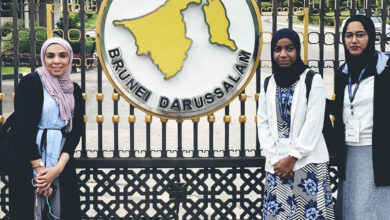فرنسا :: منح دراسية للسوريين من بلدية باريس
إطلاق برنامج منحة باريس للطالبات والطلاب السوريين يأتي تمويل المنحة من بلديّة باريس. جمعيّة الديموقراطية والتعاون في سوريا، غصن زيتون هي التي تدير البرنامج بالتعاون مع مؤتمر رؤساء الجامعات في فرنسا وجمعية فرنسا أرض اللجوء، كما تشارك المؤسسات الأخرى المذكورة في الإعلان وضمنها اتحاد المنظمّات الطبيّة الإغاثيّة السورية UOSSM”.
[wp_ad_camp_3]
عدد المنح المقدّمة: كما في الإعلان 25 منحة فقط
يجب على المتقدمين إرسال جميع الملفات المطلوبة كي يتم قبول ترشيحهم
نوعيّة الدراسات الجامعيّة المفتوحة: جميع الاختصاصات في السنين الجامعيّة الأولى حتّى البكالوريوس، دون الدراسات العليا (الدكتوراه). يُمكن لراغبي دراسة الماجيستير التقديم ولكن ليست الأفضليّة لهم.
• الجامعات المعنيّة: من قائمة الجامعات والمدارس الكبر فيالمنطقة الباريسية، ويمكن مراجعة الواصلات التالية:
[wp_ad_camp_2]
https://www.sorbonne.fr/toutes-les-universites/
https://www.sorbonne.fr/tous-les-grands-etablissements/
http://www.parisetudiant.com/…/formati…/ecole-ingenieur.html
[wp_ad_camp_1]
شروط المنحة :
*ان يكون عمر المقدم اقل من ٢٦
*ان يكون سورياً أو فلسطينياً سورياً
*ان يقطن في الداخل السوري أو دول الجوار ؛تركيا،الاْردن،لبنان
*ان يكون حاصل على الشهادة الثانوية
*ان لايكون المقدم حاصل على منحة من جهة اخرى
[wp_ad_camp_2]
ماتقدمه المنحة :
*سنة لغة حتى الدخول الى الجامعات الباريسية
*500 يورو شهرياً
*سكن جامعي ضمن CROUS
[wp_ad_camp_3]
طريقة التسجيل :
*يقوم الطالب بتعبئة الطلب إلكترونياً
*يقوم الطالب بإرفاق نسخة عن شهاداته الثانوية
*صورة عن جواز السفر
*صورة عن الهوية الشخصية أو الكمليك
*صورة عن شهادات إضافية توفل،ايلتس الخ (ان وجد)
يُمكن تحميل استمارة الترشيح من الرابط التالي : PDF او Word
ترسل الترشيحات قبل 5 تموز إلى العنوان الالكتروني التالي desgz.paris@gmail.com
[wp_ad_camp_3]
اخر موعد لتقديم الطلبات هو : 05.07.2017
ملاحظة : جميع الأفرع متاحة ،اما عن الطب فسيجرى امتحان للطلبة بعد القبول .
سيتم انتقاء الطلبات من قبل الجامعات الفرنسية .
على جميع الطلبة ترجمة كافة الأوراق والشهادات الى اللغة الفرنسية أو الانكليزية (ترجمان محلف )
[wp_ad_camp_2]
إجابات على بعض التساؤلات المكرّرة:
• اللجنة الفاحصة التي تقوم بالاختيار: لجنة مشكلة من رؤساء جامعات باريس وكلياتها الكبرى. وتراعي اللجنة الفاحصة التوازن الجندري بين الشابات والشباب، كما تنويع الاختصاصات المقبولة وتوزيعها على الكليّات والجامعات الباريسيّة.
• تدريس اللغة الفرنسيّة: سيتمّ في إحدى جامعتي باريس 8 وباريس 13 خلال سنة كاملة.
• الجامعات التي يمكن الولوج إليها بعد السنة الأولى: جميع الجامعات والكليات الكبرى في المنطقة الباريسيّة حصريّاً.
• الدراسات الطبية: يتطلب النظام الفرنسي إعادة السنة الأولى وتقديم فحص يسمّى PACESS. بعده يمكن لمن درس عدّة سنوات طبيّة العملعلى تعديل سنواته.
• الطلاب الذين تقدّموا لفحص الثانوية العامّة هذه السنة: يمكنهم الترشحّ شرطيّاً، على أن يتقدّموا بوثائق علامات سنوات الثانويّة الثلاث.
• ماذا بعد سنة المنحة الأولى: يستطيع من يتسجّل في الجامعة بعد حصوله على المستوى المطلوب بالفرنسيّة أن يتقدّم للحصول على منحة جامعيّة لتغطية استكمال دراسته أو أن يقوم بعمل جزئي لتغطية نفقاتها.
[wp_ad_camp_2]
• إرسال استمارة الترشيح والوثائق: حصريّاً إلى العنوان الالكتروني desgz.paris@gmail.com من عنوان المتقدّم الفرديّ.
• استمارة الترشيح: يجب أن تتمّ تعبئتها باللغة الانكليزيّة أو الفرنسيّة، وأن ترفق مع صورة شخصيّة. ومن الأفضل أن تكون الوثائق كاملة عند الإرسال كما هو مبيّن (لصعوبة متابعة عدد الملفّات المتوقّع ملفّاً ملفّاً)، على أن توضع صورة الشهادة الثانويّة مع ترجمتها المحلّفة، وصورة الوثائق الجامعيّة الحاليّة، وأن تكون السيرة الذاتية ورسالة الدوافع (توضيح الدراسة المرغوبة) بالفرنسيّة أو بالانكليزيّة.
• الوثائق الشخصيّة المطلوبة: صورة عن جواز السفر أو عن الهويّة الشخصيّة (الإقامة في سوريا) أو عن التسجيل في المفوضيّة العليا للاجئين (الإقامة في دول الجوار) أو عن الإقامة في فرنسا (الإقامة في فرنسا). من الأفضل أن يكون حاملاً لجواز سفر إذ أن خيار اللجنة الفاحصة سيكون في آب وبداية الدراسة في أيلول.
• ترجمة وثائق الدراسة المحلّفة: الشهادات حصريّاً للغة الفرنسيّة أو الانكليزيّة. للأسف لا يمكن التعامل مع الوثائق باللغة التركيّة.
• الإجابة على التساؤلات: نظراً للعدد الكبيرللطلبات خلال أيّام قليلة، تأسف الجمعيّة أنّها لا تستطيع أن تجيب على جميع التساؤلات الخاصّة وتبيان ما ينقص في الملفّات الفرديّة.










